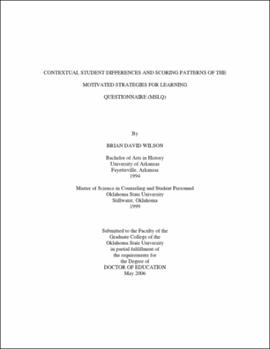| dc.contributor.author | Wilson, Brian David | |
| dc.date.accessioned | 2013-11-26T08:35:02Z | |
| dc.date.available | 2013-11-26T08:35:02Z | |
| dc.date.issued | 2006-05 | |
| dc.identifier.uri | https://hdl.handle.net/11244/7631 | |
| dc.description.abstract | Scope and Method of Study: The purpose of the study was to first re-establish factorial validity for the MSLQ and assess its predictive strength for low, middle and high income students, and then evaluate if academically successful Motivations and Learning Strategies profiles differ along income and ethnic lines by conducting regression analyses and a multivariate analysis. | |
| dc.description.abstract | Findings and conclusions: Students from low income families lag behind their upper and middle class counterparts in terms of academic achievement. As more and more of these low income students attend college, the question of how to address the issues faced by these students and aid them in persisting to degree completion takes on a new significance. Substantial research exists, indicating motivation and the use of certain study skills methods may be two likely indicators of student success. The Motivated Strategies for Learning Questionnaire (MSLQ) has been used to attempt to link motivation and the use of certain learning strategies (e.g., study skills) to GPA. However, the instrument had not been used previously to ascertain whether there are significant differences in motivation and the use of certain study skills methodologies among different socioeconomic groups. In this study, the MSLQ was given to a group of students whose socioeconomic status was captured as a part of the study to determine whether the MSLQ is as strong a predictor of academic success, as measured by GPA, for low income students as it is for middle and high income students. This study tested the hypothesis that motivational profiles, and certain study skills methodologies, differ according to the student's socioeconomic status. Although the predictive ability of the MSLQ proved to be weak overall, the results of the study suggest the predictive strength of both the motivation and the learning strategies sections was influenced by a student's economic background. None of the motivation subscales reached significance for the low income group of students. In contrast, the predictability of the instrument increased dramatically for both the middle and high income groups. Although most of the subscales of the learning strategies section did reach significance, the predictive strength to the dependent variable, GPA, was still much less for low income students than it was for middle and high income students Interpretation of the results of the study concluded that confounding variables outside the scope of what the MSLQ were intended to measure were responsible for the loss of predictability of the motivation section for the low income group. | |
| dc.format | application/pdf | |
| dc.language | en_US | |
| dc.rights | Copyright is held by the author who has granted the Oklahoma State University Library the non-exclusive right to share this material in its institutional repository. Contact Digital Library Services at lib-dls@okstate.edu or 405-744-9161 for the permission policy on the use, reproduction or distribution of this material. | |
| dc.title | Contextual student differences and scoring patterns of the Motivated Strategies for Learning Questionnaire (MSLQ) | |
| osu.filename | Wilson_okstate_0664D_1872 | |
| osu.accesstype | Open Access | |
| dc.type.genre | Dissertation | |
| dc.type.material | Text | |
| thesis.degree.discipline | Teaching and Curriculum Leadership | |
| thesis.degree.grantor | Oklahoma State University | |
